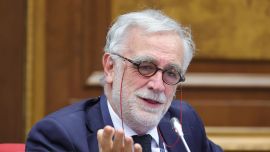Here is a conundrum.
Argentina, which is on the verge of defaulting on its local-currency debt, plans at the same time to buy back US$1 billion in foreign-currency debt due only in 2029 and 2030.
Economy Minister Sergio Massa explained that the recent drop in Argentina's country risk rating opened a "window of opportunity." In October, Argentine 2030 bonds were trading below 20 cents per dollar. On Tuesday they had risen to 32.6 cents, but today they soared 11 percent to 36.3 cents. It is generally thought that it is better to buy back bonds when they are cheap than when they have just posted a sharp rise, but perhaps Massa knows something we don't.
S&P Global Ratings downgraded the country's local debt to selective default on January 6, following a debt swap to delay payments due in the first quarter. Argentina extended debt maturing this quarter to new securities due in April, May and June, bonds due in July, September and February 2024 and inflation-linked notes due in June. The country has had difficulty getting interested buyers for its local debt sales with inflation approaching 100 percent.
I find this hard to understand. The international debt buyback will likely come from foreign exchange reserves. But if Argentina has excess dollars it doesn't know what to do with, it could sell some to shore up its currency, or perhaps repay the International Monetary Fund some of the money it owes it. Last month, the country negotiated a deal with IMF staff that will give it access to some US$6 billion, which it is supposed to use to shore up its reserves and address old debts to the Fund.
Why is Argentina buying back bonds that just went up in price when it apparently has much better things to do with that money?
by Sebastian Boyd, Bloomberg


















Comments